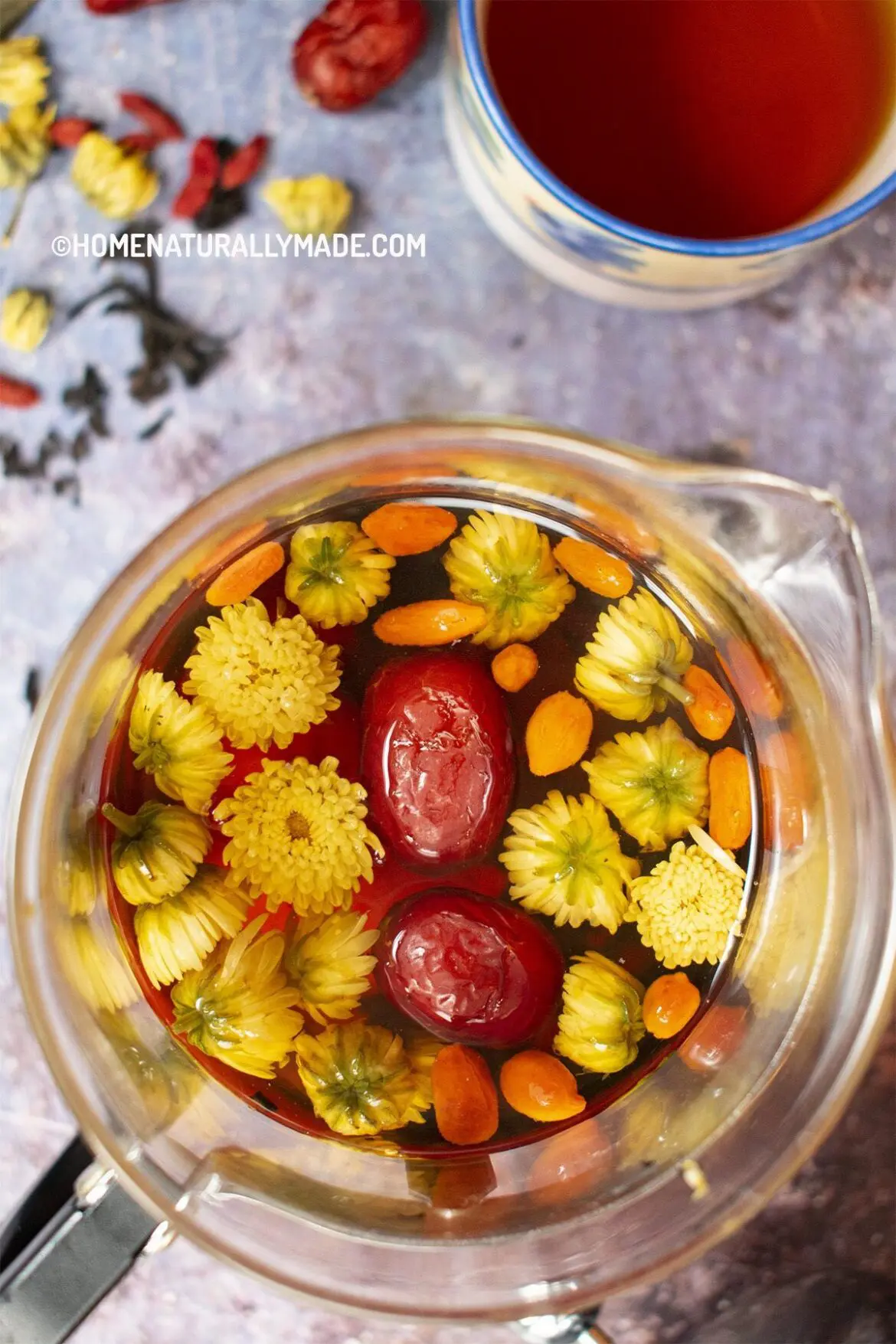Table of Contents
Eight Treasures Tea, or Ba Bao Cha {八宝茶} in Chinese, is a traditional semi-sweet Chinese tea. It features loose tea leaves brewed together with assorted dried flowers, fruits, and/or herbal leaves, along with rock candy. It is satisfyingly hydrating, nourishing and tasty. When dried flowers, fruits, and/or herbal leaves are carefully picked, it offers amazingly increased health benefits.
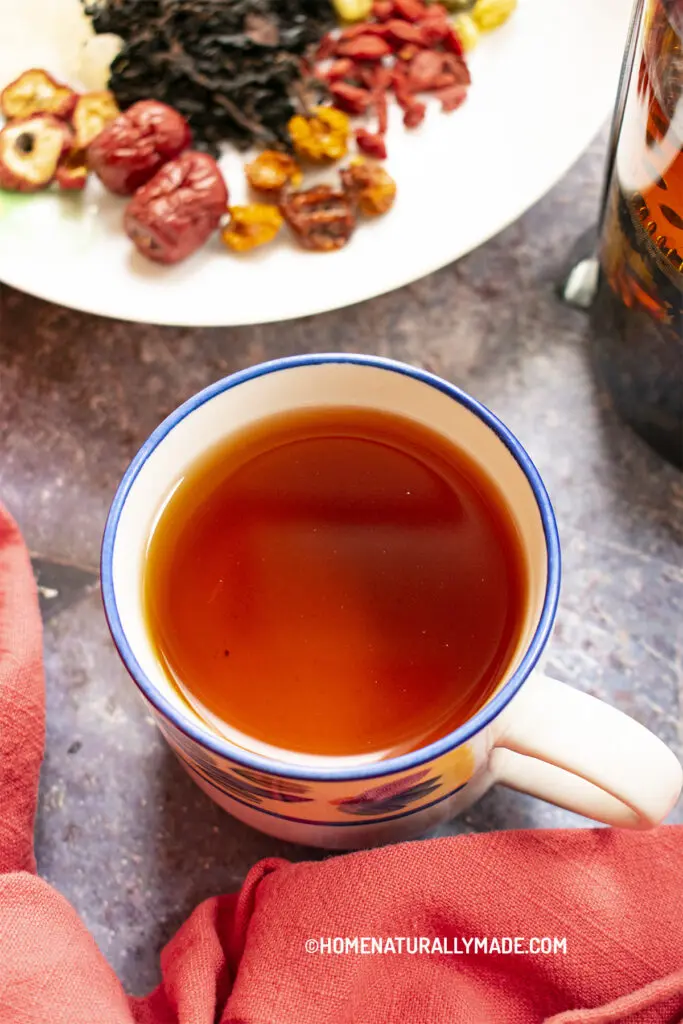
What are the popular eight treasures in Chinese traditional Eight Treasures Tea?
Naturally, the first treasure is loose tea leaves. A semi-fermented tea, dubbed Red Tea {Hong Cha 红茶} in Chinese is best suited for Ba Bao Cha. It has a mild flavor and taste, blended perfectly with other treasures to create a tasty herbal tea. My favorite Chinese Red Tea is called Da Hong Pao {大红袍}, which loosely translates as “Grand Red Robe”
Typical Chinese green tea or black tea has a sharp flavor, which would be overpowering. Green tea usually also has a subtle bitterness. Well, don’t get me wrong, I love Chinese green tea and am a huge fan of Dragon Well {Long Jing 龙井} Green Tea. However, green tea is better to drink by itself in my opinion.
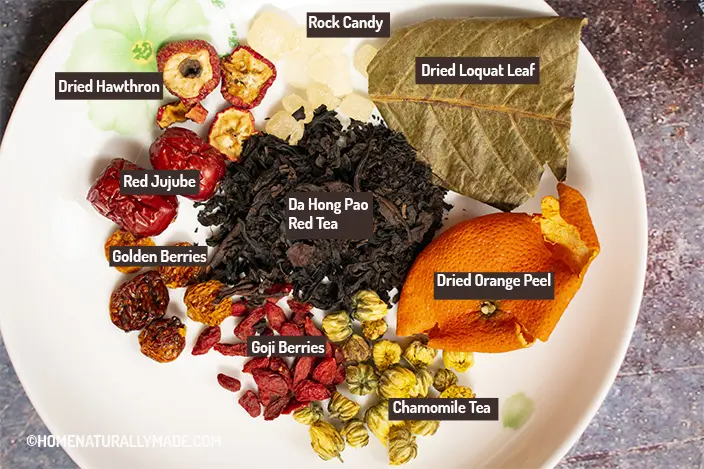
Besides loose tea leaves, red jujubes, chamomile tea, Goji berries, dried hawthorn, and rock candy are among the most popular ingredients for Eight Treasures tea.
I also like dried mandarin orange peel, dried loquat leaf, and golden berries.
Hawthorn Berry Fun Facts
Hawthorn Berry, or Shan Zha {山楂} in Chinese, is a popular fruit tree in northern China and Russia, among other places. I remember listening to the Russin folk song “Hawthorn Tree” when I grew up in China in the 70s. Needless to say, I am ecstatic to find these all-natural wholesome dried hawthorn berries from Siberian.
No doubt the hawthorn tree is one of mother nature’s wonder trees. The tender leaves sprout out during the early spring making delicious leafy vegetables, another vegetable grown on the tree, besides Toona Sinensis. The blossom in late Spring is breathtakingly beautiful and then the flowers turn into these superfood hawthorn berries.
The Chinese version hawthorn berry often reminds me of the Montmorency Cherry. Both have similar bright red color and have a powerful tart and tangy taste. Because of this, people rarely eat the Chinese hawthorn berry directly, but often add it to hot tea or make candied snacks out of it.
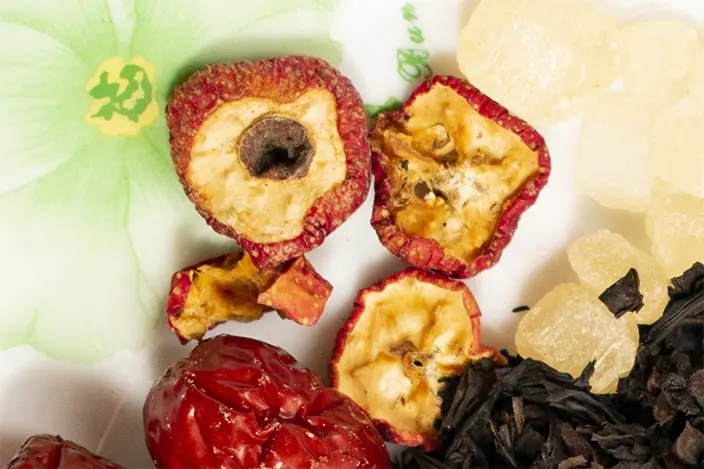
Hawthorn Berry Health Benefits
These bright red hawthorn berries are an impressive superfood. They are loaded with antioxidants and anti-inflammatory properties. People believe the hawthorn berry is especially instrumental in improving heart-related health.
For instance, hawthorn can potentially help lower blood pressure and cholesterol levels. It can also support digestion.
Loquat Leaf Health Benefits
Loquat is another wonderful fruit tree. As a child growing up in China’s Yangtze River Delta, I was privileged to have enjoyed many fresh and seasonal vegetables and fruits. Loquat, called Pi Pa {枇杷} in Chinese, is one of them. They are yellow-looking and plum-sized fruits, but with one or multiple seeds.
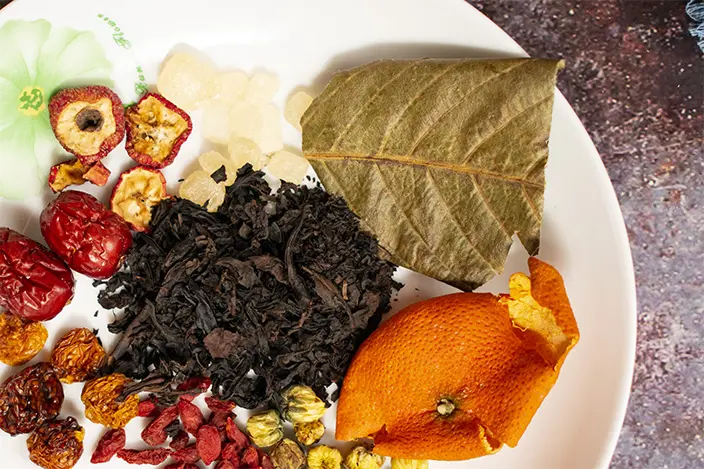
The leaves of the loquat tree are rich in antioxidants and essential nutrients. People in China have been leveraging loquat leaves into TCM {Traditional Chinese Medicine} cough & cold syrup since ancient times.
This is perhaps the most potent and tasty Eight Treasures Tea
Superfood goji berries, golden berries, hawthorn berries, jujubes, loquat leaf, and dried mandarin orange peel, chamomile flowers offer bountiful essential nutrients including antioxidants and anti-inflammatory substances. It hydrates, soothes, and strengthens the body systems at the same time. It boosts the immune system and helps strengthen respiratory health.
These treasures also work wonderfully together to create an appetizingly yummy flavor and taste.
How to brew Eight Treasures Tea at home easy, tasty, and healthy?
Tip No.1 is to pack the eight treasures tea bags in advance
I usually use a snack bag to hold all the ingredients to brew a pot of Ba Bao Cha {Eight Treasures Tea 八宝茶}, and make about a dozen of them at a time. This way, I can easily brew a pot of Eight Treasures Tea anytime I want it.
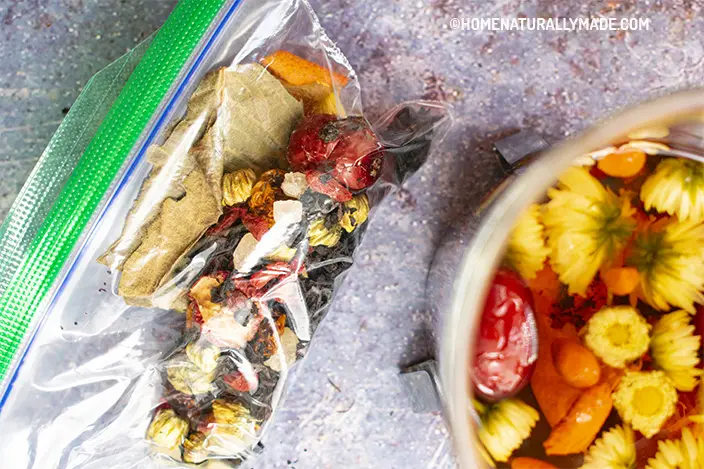
Tip No.2 is to use a large tall teapot to brew the perfect cup of Eight Treasures Tea
My favorite teapot to brew Ba Bao Cha {八宝茶} is a French Press. It is tall & big enough to brew the assortment of outstanding treasure ingredients. Plus, you can see the amazing tea.
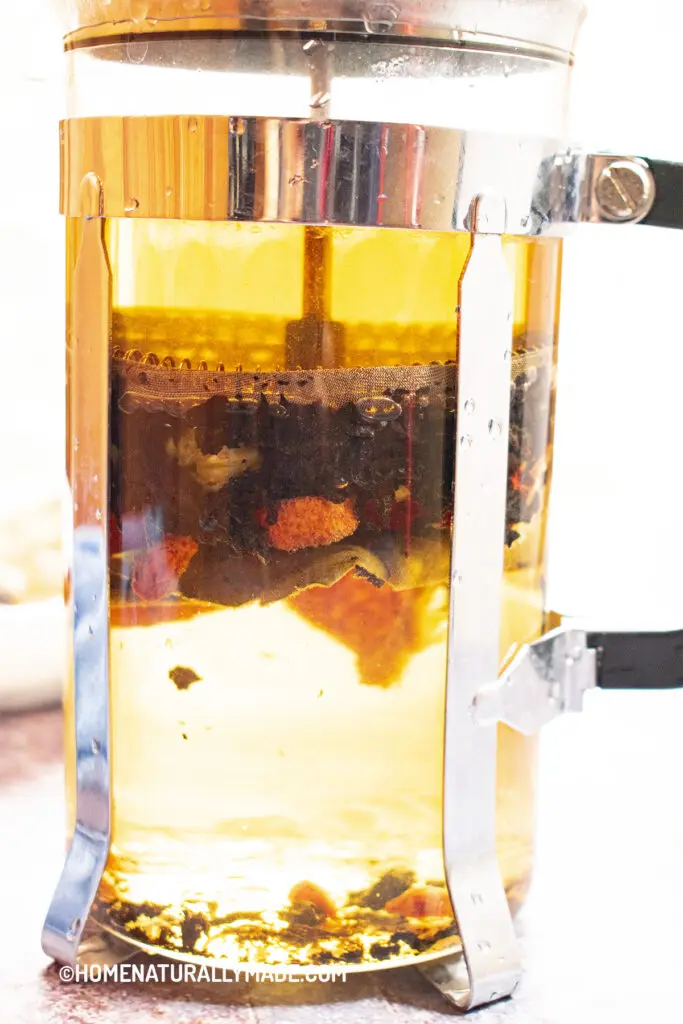
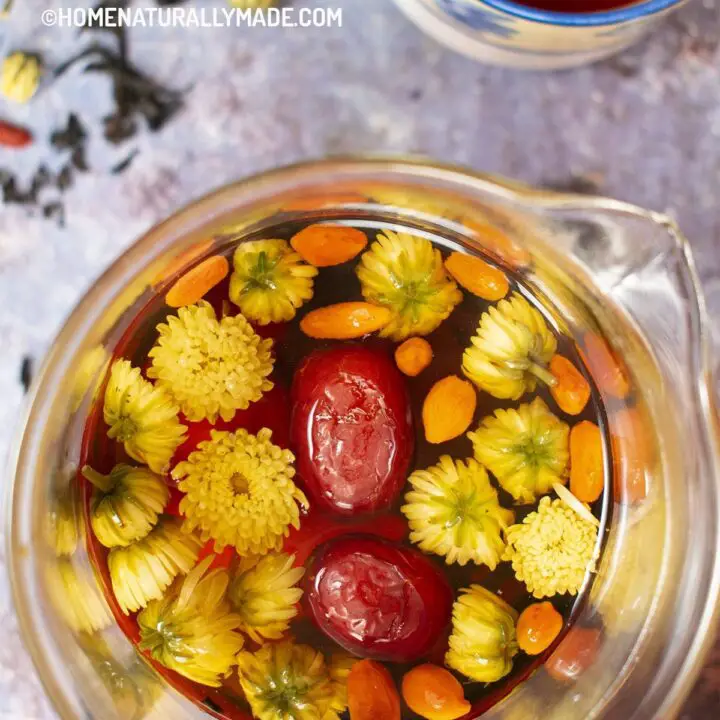
Eight Treasures Tea Recipe
Eight Treasures Tea, or Ba Bao Cha {八宝茶} in Chinese, is a traditional semi-sweet Chinese tea. It features loose tea leaves and assorted dried flowers, fruits, and/or tree leaves.
Ingredients
- 2 tbsp loose tea leaves, such as Da Hong Pao {Grand Red Rope}
- 1 large dried loquat leaf
- 1 dried mandarin orange peel
- 1 tbsp chamomile tea flowers
- 1/2 tbsp dried Goji berries
- 1/2 tbsp dried hawthorn berries slices, or golden berries
- 2 red jujubes
- 1/2 rock candy
Instructions
- Add all the ingredients into a French Press and pour in the boiling water.
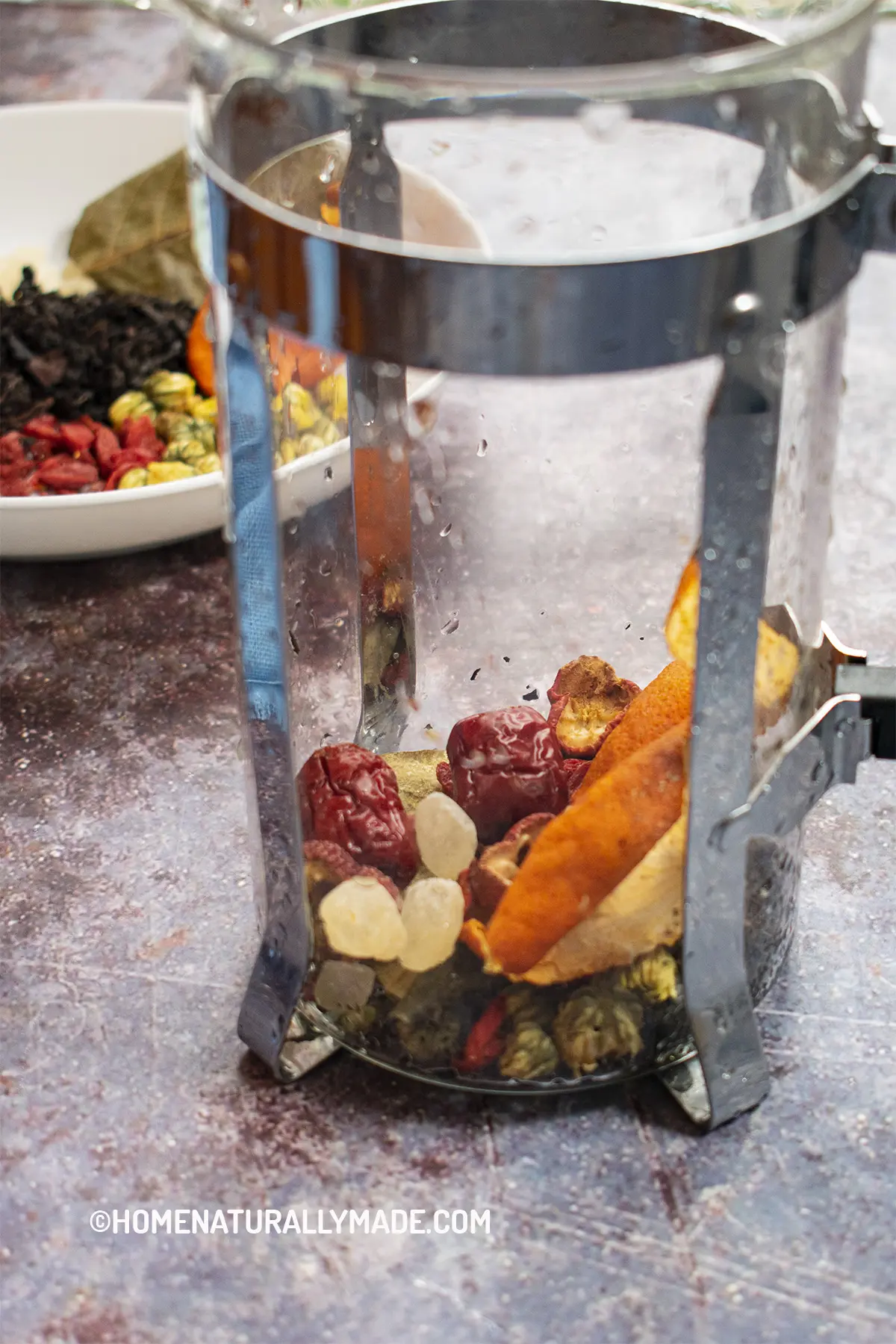
- Cover with the lid, gently press down, and let it brew for about 10 minutes.
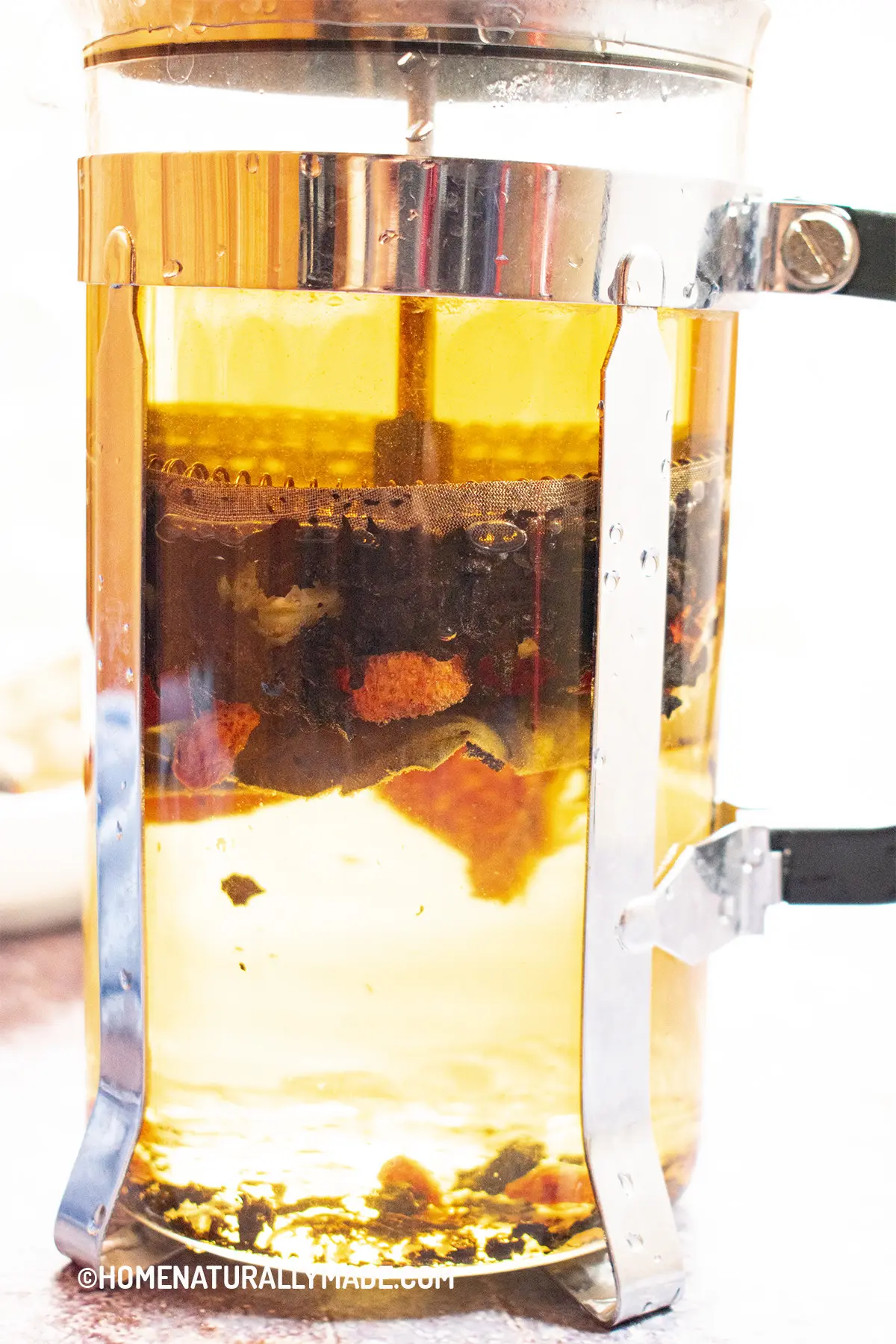
- Pour out in a cup and enjoy!
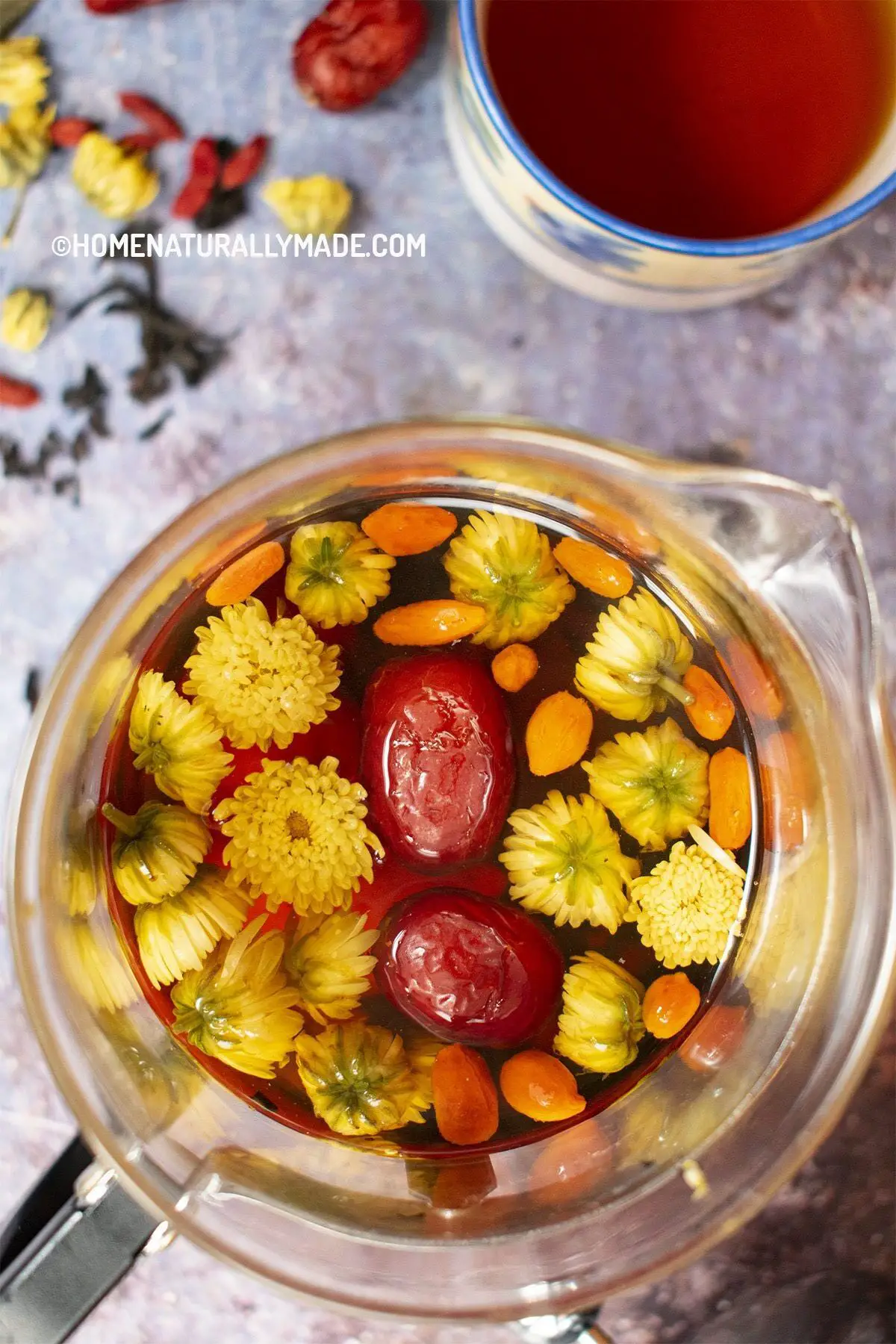
- Tip: pack the Eight Treasure Tea ingredients in advance for convenience.

Notes
- A semi-fermented tea, dubbed Red Tea {Hong Cha 红茶} in Chinese is best suited for Eight Treasures Tea. It has a mild flavor and taste, blended perfectly with the other "treasures" to create a tasty herbal tea. My favorite Chinese red tea is called Da Hong Pao {大红袍}, which loosely translates as "Grand Red Rope".
- Loquat leaves have been incorporated in TCM {Traditional Chinese Medicines" cough & cold syrup and remedies since ancient times.
- Hawthorn is loaded with antioxidants and anti-inflammatory properties that can help lower blood pressure and cholesterol levels.
Recommended Products
As an Amazon Associate, I earn a small amount of commission from the qualifying purchases.
Nutrition Information
Yield 4 Serving Size 1Amount Per Serving Calories 50Total Fat 0gSaturated Fat 0gTrans Fat 0gUnsaturated Fat 0gCholesterol 0mgSodium 4mgCarbohydrates 12gFiber 2gSugar 8gProtein 1g
Nutrition calculation is provided by Nutritionix to the best knowledge per ingredients description and isn't always accurate.
